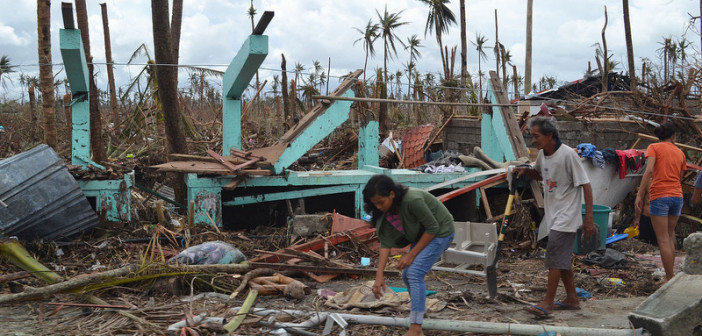MANILA, Philippines – Shortly after Super Typhoon Yolanda (Haiyan) devastated the Philippines in November 2013, Canadian Senator Tobias Enverga Jr found a bag of clothes on his doorsteps. It was a donation for Yolanda survivors.
Enverga – “the only Filipino senator outside the Philippines” – said this shows how much Filipinos “actually make such an impact on the Canadian social fabric.”
Canadian Ambassador to the Philippines Neil Reeder agrees.
Reeder said: “When Haiyan came along, Canadians were deeply touched with what they saw. Canadians have many family ties to the Philippines. Every person I basically seem to meet in the Philippines has a family tie to Canada.”
He also said that Canadians, through the media, also heard Yolanda survivors “speaking in English about their situation, which also communicated their situation even better to audiences in Canada.”
Reeder explained this as he announced a new P700-million* ($14.67-million) round of donations for Yolanda survivors.
Canada said it is coursing the P700-million donation through the following groups:
- 1. Canadian Cooperative Association
- 2. Center for International Studies and Cooperation
- 3. Care Canada
- 4. Adventist Development and Relief Agency World Renew Consortium
Reeder said Canada is coursing the aid through non-governmental organizations, not the Philippine government, “because of the speed, because of the need to move quickly, and because we don’t, as a government, want to be involved in the details, nor do we think it’s efficient to have other governments involved.”
Based on latest government data, the Philippines has completed only 30.3% of projects and activities to rebuild Yolanda-hit communities.
Explaining Canada’s new round of donations, Reeder stressed that the Philippines remains an important country for Canada.
The Philippines, after all, is “the largest source country for new Canadians” based on latest data.
Reeder said 800,000 Canadians of Filipino origin live in Canada, a country of 34 million people.
This means around 2.4% of Canada’s population came from the Philippines.
He added that Canada has issued 40,000 permanent resident visas to Filipinos, making the Philippines “the largest source of immigration to Canada” ahead of India and China.
Reeder also said Tagalog is the “fastest growing language group.”
Tagalog, in fact, is one of the top 5 languages spoken in Canada, along with English and French.
“Given that strong Filipino-Canadian community, there’s a lot of interest in Canada in what happens in the Philippines,” Reeder said.
Canadian Sen. Tobias Enverga: From mailroom worker to senator
Born in Lucena, Quezon, Enverga belongs to this Filipino-Canadian community.
An economics graduate from Letran in Manila, he first worked in a Philippine bank. He then left the Philippines in 1981 and flew to Canada, where he “started with the lowest of the low” – as a mailroom worker.
Enverga later took a course in information technology, among other things, to improve himself. Eventually he became a project manager at the Bank of Montreal, his workplace for more than 30 years.
Now the father of 3 children, he became a Canadian citizen in 1985.
Then Canadian Prime Minister Stephen Harper appointed him to the Canadian Senate in 2012.
Enverga said that because of his 3 decades in Canada, he himself knew that Filipinos can influence Canadians to help Yolanda survivors.
He said that when Yolanda struck the Philippines, Filipinos banked on being “the most employed citizens in Canada.”
Back then, every Filipino-Canadian employee “just asked their boss, ‘Boss, we have to contribute funds to the Philippines.’”
The Filipino-Canadian senator said, “So those kinds of little things made it happen.”
Canadians donate $85 million to Haiyan survivors partly due to Filipino influence. Their government will match this, doubling the amount to $170 million
Filipinos have become “very familiar” to Canadians that it made them “want to help,” Reeder said.
This means the Philippines will receive at least P6.92 billion ($170.23 million) from the Canadian government and Canadian individuals.
This is around 2% of the initial estimate of P360.9 billion ($8.17 billion) that the Philippines needs to rehabilitate Yolanda-hit communities.
Funding is always about the government, but the emotional part that is linking this money with the activities on the ground definitely is unique,” Beck told Rappler in an interview.
Beck, who is married to a Filipino, also said the focus of Filipinos on “extended family relations” helped in increasing donations. He noted that many Filipinos from abroad donated to Yolanda survivors. –
Rappler.com




